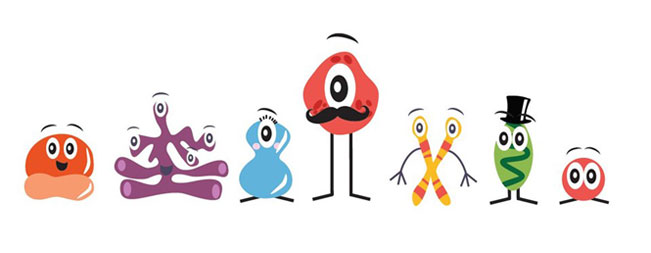31. 10. 2022
Already in 1903, the Russian biologist Nikolai Konstantinovich Koltsov (1872-1940) introduced the concept of the cytoskeleton, a “cellular skeleton” that is responsible for cellular shapes. But only now is it becoming clear how important for tissue integrity are the cytoskeletal crosslinker proteins aka cytolinkers. Mutations in the genes encoding these proteins frequently lead to the development of diseases associated with tissue fragility. Well-known examples are plectinopathies, multisystem disorders manifesting with skin blistering and muscular dystrophy.
3. 5. 2022
In the journal Science, an international team of scientists with Czech participation described a yet unknown process by which cancer cells try to resist the effects of radiotherapy, i.e. radiation. They found that one of the cells’ defence strategies is that they cause further DNA damage to themselves and pause their cycle before starting to divide. This gives them time to repair the more serious damage caused by radiotherapy.
25. 2. 2022
“Our previous studies in transgenic mouse models have shown that plectin mutations affect the ability of cells to form functional cell junctions in, for example, the epithelia of the intestinal mucosa or liver bile ducts,” says Martin Gregor.
22. 3. 2022
“Everything is improving, Czech science has moved on considerably in the last thirty years – we have opened up to the world, we have state-of-the-art equipment, new institutes. I am very happy for that,” says biochemist and geneticist Václav Pačes in an interview for UK Forum. Although he has spent most of his professional life at the Czech Academy of Sciences, he has been in close contact with Charles University since childhood.
11. 3. 2021
Probably everyone knows someone in their environment who suffers from allergies, most often to pollen, dust mites, wheat gluten, milk or nuts. Parents of young children also experience skin allergies in their offspring (up to a fifth of children under six years of age have skin allergies). In general, an allergy is defined as a disproportionate reaction of the immune system to various substances from the environment, initially quite harmless. These are called allergens and are usually proteins of plant or animal origin.
16. 8. 2020
Tasting the world by children turns out to be an important part of evolution. The sand in the mouth, along with the microbes in it, is important for building immunity and may protect against the development of autoimmune diseases. “There are billions of important bacteria in the gut. Certain microbes can prevent the development of type 1 diabetes or multiple sclerosis,” says the head of the research team from the Academy of Sciences, immunobiologist Dominik Filipp.
22. 4. 2019
TÝDEN magazine continues its series in which it presents the most important domestic scientists in cooperation with the Czech Academy of Sciences. In the tenth part, PETR DRÁBER, director of the Institute of Molecular Genetics, speaks. “We are intensively focusing on genetic modifications of poultry, for example, because partial genetic modifications can lead to improved poultry meat production, but also to poultry being resistant to infections such as the avian flu virus.”
14. 6. 2019
Epigenetics. It is a relatively new scientific field and, above all, a term referred to in many biological, anthropological, sociological and psychological studies. It examines the transfer of information between organisms from one generation to the next, but in a way where the information is not stored directly in DNA (this is what genetics deals with). “A lot of mechanisms that are referred to as epigenetic in the literature are not actually epigenetic at all,” says prof. Petr Svoboda (45), head of the Laboratory of epigenetic regulations at the Institute of Molecular Genetics of the Czech Academy of Sciences.
8. 9. 2018
No one knows the true potential of the CRISPR method. Its use in research is revolutionary, but in medicine it is a great unknown. Altering a few genes in a petri dish is like climbing a mountain. Curing a man with cystic fibrosis is a flight to Mars. Every drug needs to be delivered to its destination and its side effects minimized. Thousands of labs are working to make it happen, and we don’t even know what’s happening off-screen.
9. 4. 2020
21. 7. 2020
18. 9. 2019
22. 11. 2019
18. 8. 2019
6. 12. 2018
26. 4. 2016
16. 2. 2021
An interview with immunologist Václav Hořejší on why and how Covid-19 can attack the immune system of a still healthy young person.
12. 3. 2022
Interview of Olga Ryparova with Petr Svoboda about scientific ethics, falsification of results and ethics committees at scientific institutions.
Exposition Fascinating Genome …or how to light up a fish
Laboratory for Children CEITEC at Masaryk University, Petr Svoboda is the original co-author of the project and a member of the Board of Directors of Bioskop. IMG owns the registered trademark Bioskop and the domain bioskop.cz.
